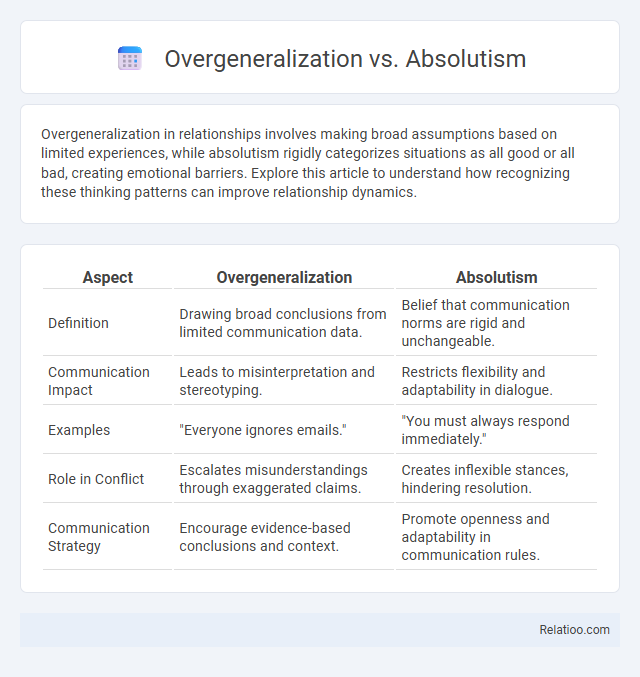Overgeneralization in relationships involves making broad assumptions based on limited experiences, while absolutism rigidly categorizes situations as all good or all bad, creating emotional barriers. Explore this article to understand how recognizing these thinking patterns can improve relationship dynamics.
Table of Comparison
| Aspect | Overgeneralization | Absolutism |
|---|---|---|
| Definition | Drawing broad conclusions from limited communication data. | Belief that communication norms are rigid and unchangeable. |
| Communication Impact | Leads to misinterpretation and stereotyping. | Restricts flexibility and adaptability in dialogue. |
| Examples | "Everyone ignores emails." | "You must always respond immediately." |
| Role in Conflict | Escalates misunderstandings through exaggerated claims. | Creates inflexible stances, hindering resolution. |
| Communication Strategy | Encourage evidence-based conclusions and context. | Promote openness and adaptability in communication rules. |
Understanding Overgeneralization
Overgeneralization occurs when a single event or experience is inaccurately applied to all similar situations, leading to distorted beliefs. It differs from absolutism, which involves rigid, black-and-white thinking without middle ground or exceptions. Understanding overgeneralization is crucial for identifying cognitive distortions that can contribute to anxiety, depression, and impaired decision-making.
Defining Absolutism
Absolutism refers to the cognitive distortion where individuals perceive situations or experiences in black-and-white terms, without recognizing any middle ground or nuance. Unlike overgeneralization, which involves applying one specific event to a broad range of unrelated circumstances, absolutism rigidly categorizes outcomes as entirely good or bad, right or wrong. Understanding absolutism can help you identify and challenge these extreme thought patterns to foster more balanced and realistic perspectives.
Key Differences Between Overgeneralization and Absolutism
Overgeneralization involves making broad conclusions based on limited evidence, often leading to inaccurate beliefs, whereas absolutism reflects an extreme black-and-white thinking style where situations are viewed in all-or-nothing terms. Overgeneralization distorts specific instances into generalized patterns, while absolutism rigidly categorizes experiences without recognizing nuances or exceptions. Understanding these key differences clarifies how cognitive distortions impact reasoning and decision-making processes differently.
Psychological Roots of Overgeneralization
Overgeneralization often stems from cognitive distortions rooted in childhood experiences, where Your brain learns to apply isolated negative events broadly, reinforcing a pessimistic worldview. Unlike absolutism, which involves rigid black-and-white thinking, overgeneralization specifically extends one event to all situations, creating patterns that affect emotional regulation and decision-making. Understanding these psychological roots can help in recognizing automatic negative thoughts and promoting cognitive restructuring techniques to improve mental resilience.
Absolutist Thinking Patterns
Absolutist thinking patterns involve rigid black-and-white perspectives, categorizing experiences as entirely good or bad without recognizing nuances. This cognitive distortion leads to inflexible judgments and extreme evaluations, often exacerbating emotional distress and limiting problem-solving abilities. Unlike overgeneralization, which broadens one negative instance to various situations, absolutism demands all-or-nothing conclusions, reinforcing mental rigidity and reducing adaptive responses.
Common Examples in Daily Life
Overgeneralization occurs when a single negative event is viewed as a never-ending pattern, such as failing one exam and believing you're a failure in all subjects. Absolutism involves thinking in black-and-white terms, like assuming if something isn't perfect, it's completely worthless. Common examples include statements like "I always mess up" (overgeneralization) versus "If I'm not the best, I'm a total failure" (absolutism), both distorting reality and impacting daily decision-making.
Impact on Communication and Relationships
Overgeneralization leads to distorted communication by applying one negative experience to all situations, causing misunderstandings and emotional distance in relationships. Absolutism creates rigid thinking patterns, making it difficult for Your conversations to adapt and resolve conflicts effectively. Both cognitive distortions reduce empathy and trust, undermining healthy interpersonal connections.
Overcoming Cognitive Distortions
Overgeneralization, absolutism, and black-and-white thinking are common cognitive distortions that can skew Your perception of reality, leading to negative thought patterns and emotional distress. Overcoming these distortions involves recognizing distorted beliefs, challenging rigid assumptions, and replacing them with balanced, evidence-based thoughts that reflect the complexity of situations. Cognitive-behavioral techniques such as thought records and cognitive restructuring empower You to break free from these mental traps and foster healthier thinking habits.
Strategies to Avoid Absolutist Language
Avoid absolutist language by incorporating nuanced expressions such as "often," "sometimes," and "may," which prevent rigid and extreme statements. Employ evidence-based qualifiers that reflect variability and complexity in data, enhancing the credibility of arguments and reducing overgeneralization. Utilize cognitive-behavioral techniques like perspective taking to recognize and challenge black-and-white thinking patterns in communication.
Promoting Flexible Thinking
Overgeneralization involves drawing broad conclusions from limited evidence, while absolutism rigidly categorizes experiences into all-or-nothing terms, both impairing cognitive flexibility. Encouraging flexible thinking requires recognizing these distortions and cultivating nuanced perspectives that accommodate exceptions and complexities. This approach enhances problem-solving skills and emotional resilience by promoting adaptive, balanced interpretations.

Infographic: Overgeneralization vs Absolutism
 relatioo.com
relatioo.com